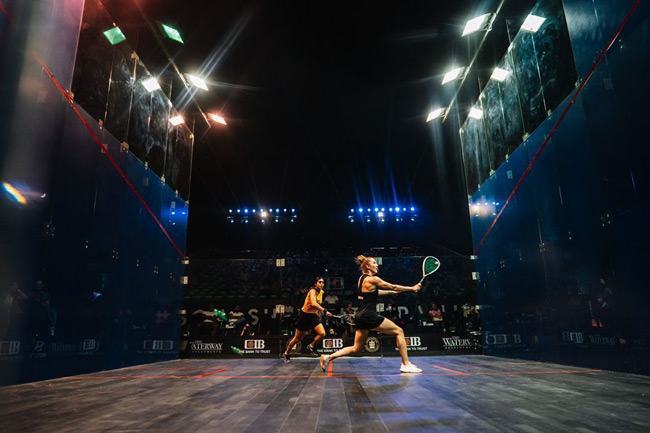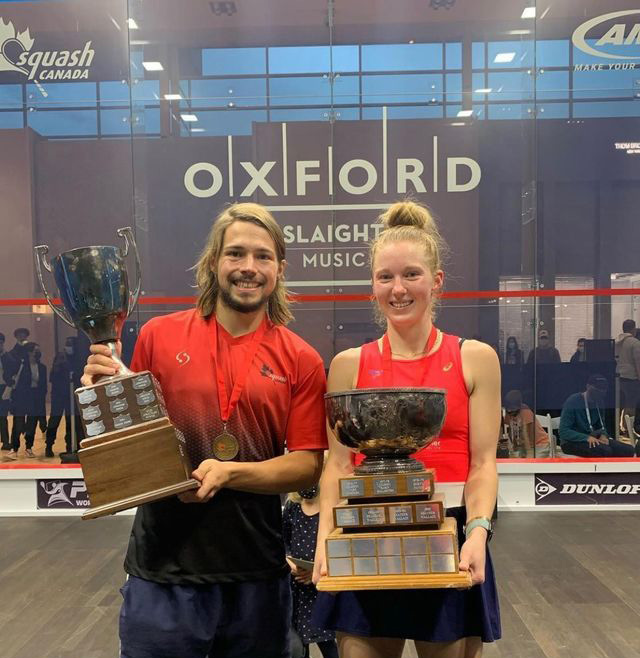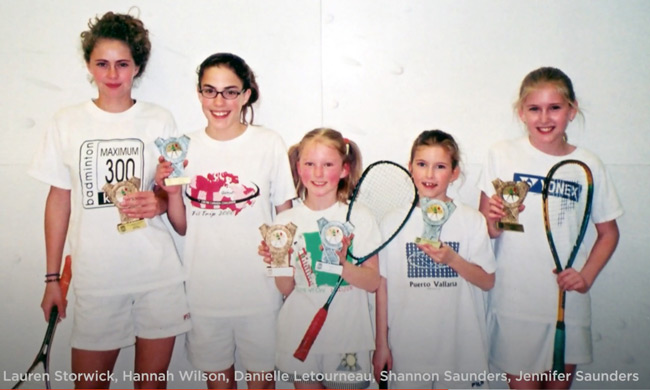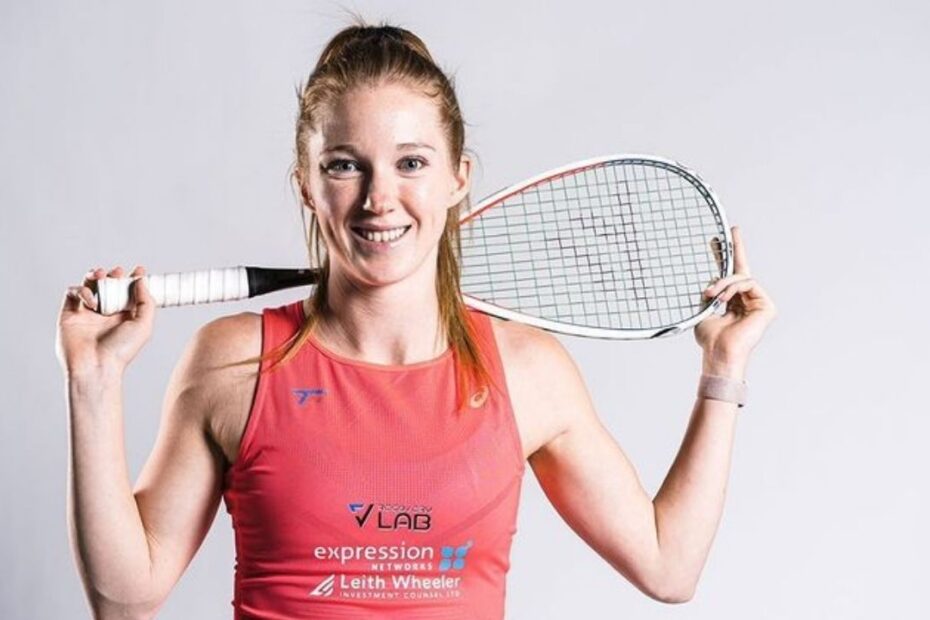Photos courtesy of Danielle Letourneau, Rhys Langdon, and Nathan Clarke.
For profile of venue, for quality of opposition, nothing can compare.
On paper, this is a third-round match at the Egyptian Open in Cairo — an impressive enough feat on its own.
But for Danielle Letourneau, it also represents her first-ever appearance with the Great Pyramid of Giza as a backdrop, a mind-blowing setting, even for seasoned squash players.
Joining the Calgarian on the glass court that night? None other than Nour El Sherbini, top-ranked woman on the planet.
Under the stars. Against the star.
So, yeah, a bit of a moment for Letourneau.
Obviously — for someone who’s won multiple national titles in multiple age groups, for someone who served as Cornell University’s No. 1 player all four of her (All-American) years — there have been highlights along the way.
But Oct. 13, 2020, stands out.

For starters, performing on one of the most unique stages in all of sport.
“Very special, very memorable,” said Letourneau. “I was so excited. It was a bit overwhelming because it’s such an iconic spot, within our sport as well. I think that’s one of my favourite experiences.”
Even if it had been tough sledding against El Sherbini, the eventual champion.
In her first test against a chart-topping contestant, Letourneau fell 11-1 right off the bat.
“The first few games were a bit of a shock, but you get yourself into it as you go,” she said. “I wouldn’t say you don’t feel you belong there because you did have to earn your way onto that court … but it’s hard to fully understand the differences — you just know that there’s a gap.
“All you’re really picking up on is how confident they are — they’re so calm. They’re there to win, there’s no doubt. So it does make you a little edgy and you might have a little bit of doubt. Not full-on impostor syndrome, but you get a little rattled.”
Despite being swept, she learned, soaking up the atmosphere, relishing the experience, expanding her considerable base of know-how.
Because this is no slouch. Letourneau’s commitment to her craft matches her ever-sharpening ability.
A seven-year veteran of the Professional Squash Association, she currently boasts a world ranking of 18th, with sincere hopes of crashing the top 10.
“I’m still hungry to go higher,” said the 28-year-old. “Once you get to a new best high, you want another one. There are times when it’s, ‘OK, I want more.’ But I am really proud of being 18th. Making top-20 was a big goal of mine. I’m happy I made it there.
“When you first start on the tour you think it might be a little bit easier than it actually is. So there have been times when I doubted whether or not I could actually do it.
“Now I have more confidence in it.”

At the glance, the pro-player existence may seem globe-trottingly exotic.
And it is true — Letourneau has accumulated scrapbooks’ worth of memories from glass-court matches alone.
At Grand Central Station in New York: “The atmosphere is very lively. You have the music, a food hall behind the court. The crowd is lively, very encouraging. So you just have to have fun while you’re out there.”
At Shanghai: “So you have this amazing view of the whole city. But the conditions are very tough. It was about 90 per cent humidity and 35 degrees. It was an experience.”
At the University of Hull for the British Open: “The oldest and most prestigious tournament on tour. So that was pretty memorable as well.”
At the waterfront in San Francisco: “You’re at sea level, you’re outside, it’s September, so the ball is absolutely dead. Or you can have wind come into it and the ball moves on you.”
Beyond postcard-cool locales, there is an element of grind to the racket.
On the job since 2015, she enters 14 or 15 tournaments a year. “More than quite a lot of people … because I like getting more match play, just trying to learn more. Once I get my ranking up, I’ll probably be pickier.”
For Letourneau, it has been manageable workload on the PSA World Tour, which runs fall till spring.
Usually, that is.
Till the pandemic, which threw a wrench into the works.

“It’s been non-stop,” Letourneau said. “Ever since September 2020 there have been tournaments just randomly popping up … (instead of) the regularly scheduled times.”
Working the circuit while being COVID-vigilant — and operating out of a bubble — is an added layer of mental strain.
“I’ll admit it’s pretty lonely,” said Letourneau. “There were two weeks in London and I ate almost every single meal alone in my hotel room. You’re taking a shuttle with your opponent to the court. You hit. You come back to your room. And that’s pretty much it. That, at times, can take its toll.”
Even at the best of times the routine — travel, practice, games, repeat — is exhausting. But Letourneau points out that it’s also fun, especially when you find own groove.
“It’s a matter of knowing yourself,” she said. “Some people go to a tournament and like to isolate quite a bit, in general — they’re just dialled in to the tournament. Other people prefer to go out and be a bit social, so they can find more balance and be happy while they’re playing. Each person’s different.
“I’m in the middle. I do like having my own space, but I think with COVID, it can be a bit much at times.”
Isolation on the road, ever-present pressure to perform, unprecedented scheduling quirks — it adds up for competitors.
“It’s been good, it’s just been busy,” she said. “A lot of players are feeling burned out or had to take a break around November, December. We had three major tournaments in the summer, so there’s no time off, really. I think people are using Christmas as that time.”
Letourneau planned to get home, too — but first she had to wend her way through the demands of recent months.
Starting in October she travelled from Cairo to Philadelphia (for the U.S. Open) … to Toronto (for the Canadian championship, which she won) … to Cairo (to train for a couple of weeks) … to England (for the London Open) … to Kuala Lumpur (for the Malaysian Open) … to Cairo (for the Egyptian Challenger Tour and the Black Ball Open, where, Dec. 12, she fell in the opening round, prompting her to tweet from her @dzlet account: “It’s time for a much needed rest. Didn’t have enough heart in the match today to give the extra push that was required. Looking forward to a better 2022.”)
Then, finally, after navigating a protocol-punctuated journey westward, she got back to Calgary.
Where she was greeted by wicked record-setting temperatures.
“A bit of a shock,” Letourneau said with a laugh. “Definitely cold.”
The Christmastime visit lasted only 10 days. And now? She’s already relocated in Philadelphia, where the U.S. Squash Association has set up a new high-performance centre. “Now almost everyone’s in Philly.” So there’s access to quality coaching and top-tier practice matches.
Living nearby, in Wilmington, Del., is her big brother, David, a former squash professional himself.
So, not surprisingly, he serves as a bit of a mentor. When his sister joined the tour, he offered advice. “Get support, have a really good team of people who encourage you and build you up,” recalled Letourneau. “So everywhere I’ve based myself, I’ve made sure I have people who are willing to help.”
Including in Cairo where she lived full-time for the past year and a half.
She has no regrets about the decision to shift her base to Egypt, a hotbed of the sport, where she was treated to superb teaching and an array of sparring partners.
“Amazing. I had a great set-up,” said Letourneau. “After a while it took its toll … with having no life balance. It’s hard to make friends or do any of the things I like to do, so all the pressure, all the focus, is always on squash. Which is good, because I improved … but eventually I was not having as much fun, so I need a bit of a change.
“But I think it was actually the best thing I could’ve done for my career. I went there at the perfect time.”

First gripping a racquet at six years of age, Letourneau was simply following suit.
All of her family members, including grandparents, play squash. Parents Michael and Laura, members at The Glencoe Club, promptly put her in a kids program. “I don’t think I really cared about making contact with the ball for a couple years,” said Letourneau, chuckling. “I cared more about spinning and having fun and making friends.”
She also dabbled in volleyball, golf, tennis, badminton.
But, dedicating herself to squash, Letourneau captured the U13 national crown.
Looking back, Letourneau says that breakout success stemmed from a conversation she’d had with her brother, who is four years older. She remembers telling David that she wanted to win a Canadian championship. His response? “Well, what are you going to do to actually get there?”
Stoked, she spent more time soloing, more time at the courts outside of program hours. She’d challenge her dad’s friends, she’d track down other junior hotshots for games.
“When I got that (U13 title), it was proof that, ‘OK, you’re doing the right thing,'” said Letourneau. “You have to work hard. You have to do the extra stuff.”
Career targets began to take shape. She recalls being in Grade 8 and thinking about becoming one of the world’s best players. “My goal, even from a young age, was always top 10.”
Letourneau bagged the U15 national championship. Her appendix ruptured right before the U17 showcase, but she prevailed at the U19 tournament.
Graduating from Western Canada High School, she was ready for the next phase — NCAA-level competition. David had gone to Princeton, and her heart was set on an Ivy League school. “Cornell seemed like a pretty good fit.”
In Ithaca, N.Y., she was the Big Red’s go-to player from the start. As a senior, she branched out, playing for Canada at the world team championship, appearing at the Pan-American tournament, wedging in a couple of pro events.
After four years at Cornell she owned a communications degree, with a minor in international relations. But turning pro was the priority. “I felt like I’d regret it if I didn’t,” said Letourneau. “I just loved it so much.”
Her family supported her decision. Although she got comments at the club. “If you’re doing something different than the status quo, people are, ‘Why aren’t you going to go work?'”
She laughs, adding that questions continue today — but they’ve changed in tone. “Now that I’m doing better, it might be more like, ‘How long are you going to play?’ Which makes me feel a little bit old.”
No matter how many minds she changes, no matter much progress she makes, no matter how lofty her ranking becomes, there will forever be a blank on her resume.
Danielle Letourneau — Olympian. No one will see that line.
Which is a sore point. Squash has come close to inclusion. In fact, the 2020 Summer Games seemed possible — which made rejection all the harsher. Letourneau says she was “crushed” by the announcement.
“Since then I haven’t gotten my hopes up for it, to be honest. I’ve kind of lost hope,” said Letourneau. “I struggled with it when you have a sport where someone who could just be doing it for a couple years … and win a gold medal.
“Whereas, with squash, you have to be playing your whole life … there’s so many aspects to it. It’s so dynamic. It is disappointing not to see it in there in the Games.”
Not that she has much time to waste on dashed dreams.
The World Tour keeps Letourneau on her toes.
Four months ago — at the 2021 Egyptian Open — guess what? She got her rematch against El Sherbini. Again in the third round. Again with the pyramids in sight.
This time, girded for the challenge, the underdog surged to a 10-8 lead. “I was playing really well,” said Letourneau. “I had the right plan. I was in it.”
Then she got into her own head. “You get those nerves because you’re like, ‘Oh, I can’t believe I’m in this position,’ and you mess it up. And the second you mess it up, they keep going. They’re not going to let you back into the match.”
Falling 12-10, 11-5, 11-3, she says belief — legitimate belief and not something manufactured — is what spells the difference between very good and elite.
“You can build yourself up, ‘Oh, I’m confident. I’m the best, I’m the best, I’m the best,’ but if you don’t actually have the skill (to back it up), then it’s just air,” Letourneau said. “I’ve found that I get confidence from doing, not just saying. The more you play (the big names) and the closer your own level gets, you can actually see and understand what you need to do, so while you’re out there, you do feel confident.”
“It’s a steep learning curve, so you learn quick. But those first few times on the glass court against a top player are very difficult.”
